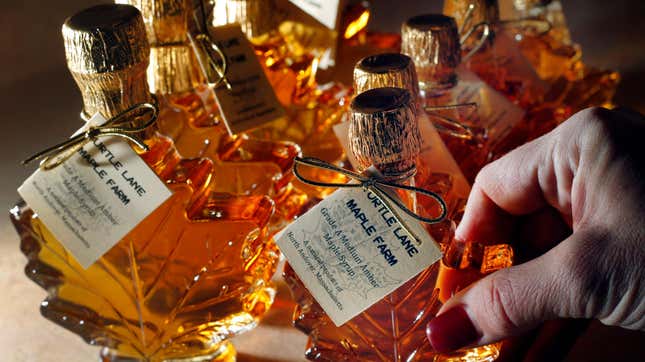
Canada’s government-sanctioned maple syrup cartel has a message for the world: Never fear, there will be syrup.
The country’s Quebec Maple Syrup Producers, also commonly referred to as the “OPEC of maple syrup,” announced in recent days that it would release almost 50 million pounds (22.6 million kilograms) of syrup from its strategic reserve following a shortfall in the year’s expected production and increased demand overseas for its sugary gold, Bloomberg News reported. The 50 million pounds of syrup the group is draining represent about half of its stockpile.
Hélène Normandin, a spokesperson for Quebec Maple Syrup Producers—which establishes bulk prices, tells producers how much they can harvest, and saves any unsold syrup for the reserve—told the outlet that output had decreased by 24% this year. The group produces more than 70% of the world’s maple syrup.
“We need to produce more maple syrup,” Normandin said last week. “The reserve is there to make sure that we are always able to sell and offer this product.”
This is the largest amount of syrup the maple cartel has released since 2008 and 2009, years where the group was forced to completely empty its reserve.
Production this year was affected by a warmer and shorter spring harvest season as well as booming demand overseas, the group told Bloomberg. Maple syrup production is tricky and greatly reliant on the weather. Trees have to be a certain age, usually between 30 or 40 years old, before they can be tapped for syrup. They also need freezing nights and warm days to produce syrup, as sap only flows in these conditions. The harvest season typically runs from late February to the end of April, but it was cut short this year because of unseasonably warm weather.
As far as demand goes, export sales rose by 21% between January and September, which translates to 113.5 million pounds (51.4 million kilograms) of maple syrup. This was fueled by the pandemic, the maple cartel maintains, as more people have been cooking at home and using local products.
Weather and demand aren’t the only things maple syrup producers have to worry about, though. The Washington Post reports that climate change and logging also pose a threat and could impact the supply of healthy trees, which gives you yet one more reason to care about the fate of the planet and take action where you can.
This year, the maple syrup cartel will guarantee you have your sugary pancake topping. However, even the cartel will have its hands tied if we don’t address climate change. What reserves will it tap if there are fewer trees? Even if trees aren’t a problem, the quality of what they produce is still in play. Let’s not forget what climate change beer tastes like (spoiler: gross).